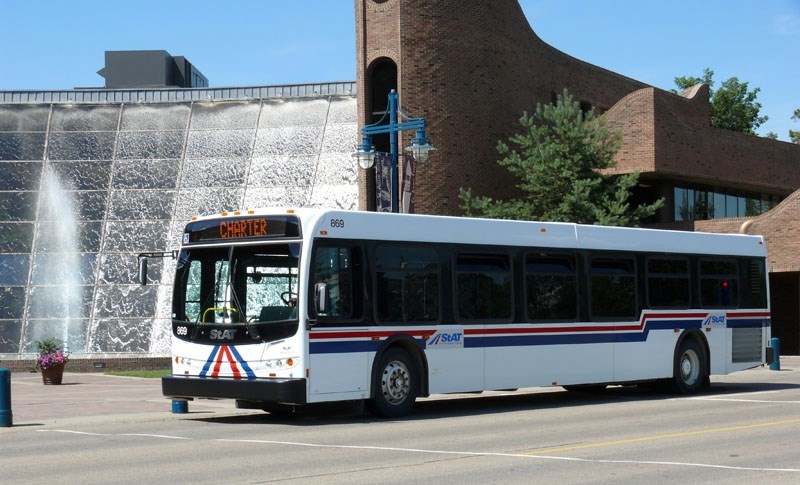Having already announced an across-the-board fare increase, St. Albert Transit now plans to end its free Saturday service in 2012 and increase service in Northridge. Otherwise it’s business as usual for the city’s fleet.
“We’ve put forward a budget that reflects basically the status quo and the Northridge service is an equity thing, making sure we’re treating neighbourhoods equally in our standards,” said director Bob McDonald, who spent part of Tuesday evening presenting his department’s budget to council.
But that plan has run into opposition from Coun. Malcolm Parker, who wants the increased service level in Northridge deferred until a long-term department plan that St. Albert Transit has already begun, is complete.
“So we’re going to do these studies and yet they want to bring forward recommendations to hire people or increase services and to me that just doesn’t make sense until you’ve completed the study,” Parker said. “Then you move forward.”
If Parker’s motion passes, Northridge could still get its daily service. The case to increase service levels does not anticipate starting until September 2012. If the department plan comes back before September and proves the validity of the request, there would still be time to implement the Northridge plan.
“I’m not against providing the services,” Parker said. “I think we have to be realistic. If we have these studies that we’re doing, let’s do them.”
On the capital side, transit will retire three 40-foot buses from the fleet that have reached the end of their lifecycle, replacing them instead with two 60-foot articulated low-floor buses at a cost of $1.395 million.
In terms of operations, service in Northridge will be upgraded to full daily service at a cost of $62,800 in 2012, increasing to almost $200,000 by 2013. The service upgrade is conditional on council passing the budget as proposed.
Northridge had previously received peak-hour service and will now be upgraded to full daily service, with buses running weekdays and on Saturdays. McDonald said the neighbourhood has grown enough that it is ready for increased service.
But even as McDonald explained his department’s budget to council, he found himself responding to some familiar questions about the perceived need for the number and size of buses the department operates.
Coun. Cam MacKay wanted to know why the city couldn’t buy smaller buses. That question feeds into one of the chief complaints residents have of St. Albert Transit — buses running local routes almost empty at certain times of the day.
McDonald said the department is trying to use its fleet as efficiently as possible. That means putting its 60-foot “bendy” buses to work on local routes throughout the city. Once they’ve finished a route, these same buses continue on to one or more of the city’s transit centres. From that point on they become commuter buses, hauling residents into Edmonton. Buses returning from Edmonton perform the same task in reverse order.
“We’re cognizant of this and it’s part of our job to try and keep explaining how we’re operating in the most efficient way and this is how we see it now,” McDonald said. “There will be opportunities for people to provide input.”
The city does operate a small fleet of smaller buses that seat approximately 24 individuals on routes with low ridership, but those buses have had their share of maintenance problems, McDonald said. The smaller buses can’t be used for commuter service, which means buying more would essentially create a second fleet — one for peak periods and one for off-peak periods, increasing both operating and capital costs.
“We would also have a fairly large storage problem.”
As for the end of free Saturday service, a motion councillors will debate sometime next week, McDonald described it as a promotional campaign that had run its course.
“For the first couple of years we saw some positive increase in ridership. Last year we didn’t,” McDonald said. “What we think is the promotion has now run its course and it’s time to look for other opportunities for promoting transit.”



